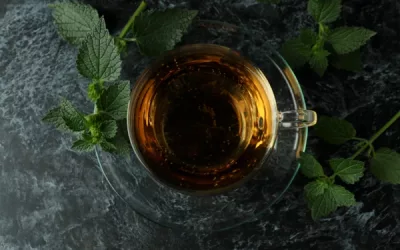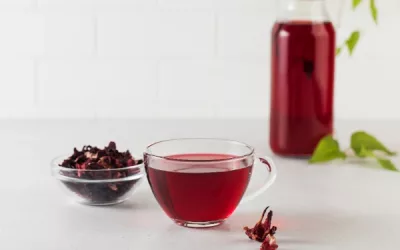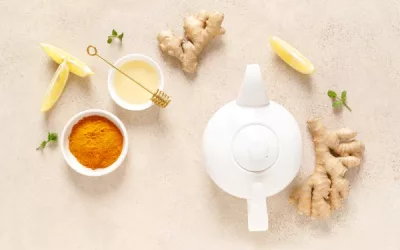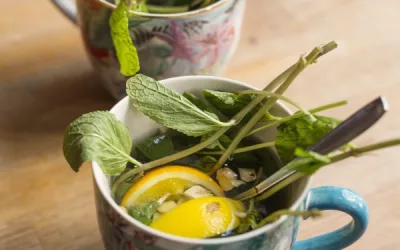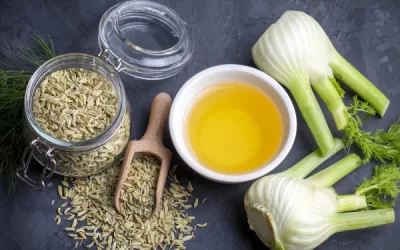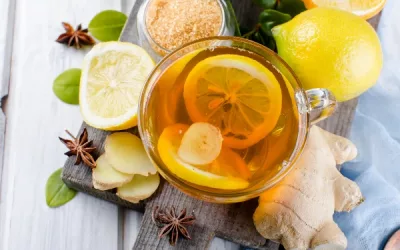Have you ever sipped a warm cup of ginger tea and wondered what benefits it brings? This natural remedy has a long history rooted in traditional medicine and is gaining popularity among health enthusiasts today. Rich in antioxidants and anti-inflammatory properties, ginger tea is not just a comforting beverage; it also supports digestion, boosts the immune system, and may even aid in weight loss. In this article, we’ll delve into everything you need to know about ginger tea, from its benefits to delicious recipes and storage tips.
Table of Content
What is Ginger tea?
Ginger tea is a herbal infusion made from the root of the ginger plant, known for its strong, spicy flavor and numerous health benefits. It is traditionally brewed by steeping fresh or dried ginger in hot water, often with added lemon or honey for extra flavor.
Ginger tea is popular for its soothing properties, particularly in aiding digestion, relieving nausea, and reducing inflammation. It has been used for centuries in traditional medicine, especially in Asian cultures, where it’s praised for its ability to boost immunity and provide relief from cold and flu symptoms.
In addition to its medicinal qualities, ginger tea is enjoyed as a warm, comforting beverage that can be consumed at any time of day. It is rich in antioxidants and compounds like gingerol, which are believed to contribute to its anti-inflammatory and anti-nausea effects.
Many people turn to ginger tea for a natural remedy to alleviate stomach discomfort, soothe sore throats, or simply to enjoy its invigorating taste. Whether consumed hot or cold, ginger tea offers a flavorful way to support overall wellness.
During the Tang Dynasty in China, ginger was so revered that it was used as a tribute to the emperors. The Chinese weren’t just using it for culinary reasons; they also recognised its medicinal properties.
Ginger tea was a common remedy for ailments, and historical records show that it was prescribed for various conditions, including digestive disorders and colds. The royal family often drank ginger tea to ensure their well-being, making it an integral part of their daily rituals.
I remember one winter when I couldn’t shake off a persistent cold. A mate suggested I try ginger tea, just like he did when he was younger. I hesitated at first, but the warmth and spice of the tea provided such comfort.
Within days, my symptoms lessened, and I felt revitalised. Since then, ginger tea has been a staple in my household, especially during the colder months or whenever someone feels under the weather. It’s become more than just a remedy; it’s a tradition that brings a sense of comfort and wellness.
How do you make ginger tea?
Making ginger tea at home is a simple and rewarding process. Not only is it a soothing beverage, but it also offers numerous health benefits. To help you get started, I’ve put together a comprehensive table that breaks down each ingredient and step, along with some optional add-ins and storage tips.
This will guide you through the entire process from preparation to enjoying your warm cup of tea.
The table below will help you to gather the ingredients, follow the preparation steps, consider optional add-ins for extra flavour, and store any leftover tea properly. Let’s dive in!
| Ingredient/Step | Description |
|---|---|
| Fresh Ginger Root | Use about a 2-inch piece, peeled and thinly sliced. |
| Water | 2 cups of water for every 2-inch piece of ginger. |
| Method | Bring water to a boil, add ginger slices, and simmer for 10-15 minutes. |
| Strain | Strain the tea into a cup to remove ginger pieces. |
| Optional Add-ins | Lemon juice, honey, or mint leaves can be added for extra flavour. |
| Storage | Store leftover tea in the fridge for up to 3 days, reheat before drinking. |
What are the health benefits of ginger tea?
Ginger tea is not just a delightful drink but also a powerhouse of health benefits. People have used ginger for centuries as a natural remedy to treat various ailments.
- Digestive Health: Ginger tea can help alleviate indigestion, bloating, and nausea.
- Anti-inflammatory: The anti-inflammatory properties of ginger can help reduce muscle soreness and joint pain.
- Immune Support: Regular consumption can boost your immune system due to its high antioxidant content.
- Menstrual Relief: Many women find ginger tea helpful in reducing menstrual cramps.
- Cold and Flu Relief: It may alleviate symptoms of cold and flu due to its warming effect.
Drinking ginger tea regularly can contribute to your overall well-being. Whether you’re sipping it to soothe an upset stomach or just enjoying its spicy warmth, ginger tea is a fantastic addition to your daily routine.
Can ginger tea help with weight loss?
Many swear by ginger tea as a part of their weight-loss journey. Though it’s not a magic potion, it can complement a healthy diet and active lifestyle. Here are some ways ginger tea can aid in weight loss:
- Boosts Metabolism: Ginger can help increase your metabolic rate.
- Suppresses Appetite: Drinking ginger tea before meals can help you feel fuller and reduce overeating.
- Enhances Fat Burning: It may increase fat burning during exercise.
- Improves Digestion: Better digestion helps in weight management by preventing bloating and constipation.
- Balances Blood Sugar: It can help stabilise blood sugar levels, reducing cravings for unhealthy snacks.
Including ginger tea in your diet can offer a small boost toward achieving your weight loss goals. Remember, it’s most effective when combined with a balanced diet and regular exercise.
Back in ancient China, ginger has been revered for its medicinal properties. Emperors and warriors alike believed in its power to heal. One story tells of a Chinese emperor who always carried ginger with him during long journeys to prevent seasickness and boost his courage.
This tradition has been passed down through generations, solidifying ginger’s place in herbal medicine.
I remember the first time I tried ginger tea. I had just returned from a long, tiring day, and a friend suggested it as a remedy to rejuvenate my energy. The warmth and spiciness of the ginger were incredibly soothing, and the hint of honey added a comforting sweetness.
Since then, ginger tea has become my go-to drink whenever I need a little pick-me-up or relief from a queasy stomach. Trust me, once you try it, it might just become your favourite too!
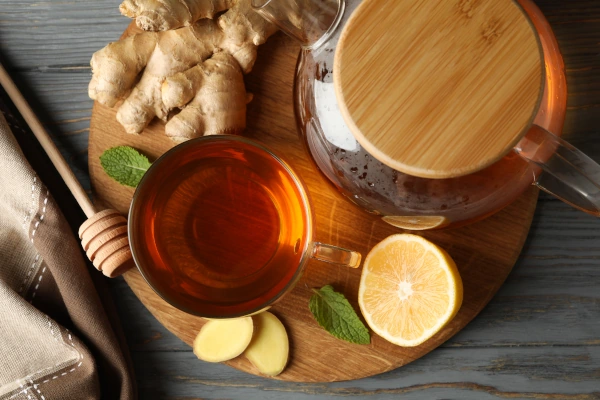
What are the variations of ginger tea?
Ginger tea, that multifaceted wonder, comes in various forms, each with its own unique blend and benefits. Let’s delve into some popular variations that will not just warm your heart but perhaps get your digestive system in top gear.
First up, we have the earthy and aromatic Ginger-Cinnamon tea. Not only does it smell like Christmas morning, but it’s also a breeze to make.
Secondly, there’s the vibrant Ginger-Turmeric tea, a golden remedy with a myriad of perks.
Thirdly, the refreshing Ginger-Mint tea that could give your digestive tract a high five.
Then there’s the tangy and invigorating Ginger-Lemon tea, the perfect wake-up call in a cup. Last but not least, the soothing Ginger-Honey tea that could essentially be your liquid comfort blanket.
This delectable cast of teas can have you singing praises for ginger, if not writing poetry about it. Each has its own preparation method and health benefits, making them worthwhile additions to any tea enthusiast’s pantry.
How do you make ginger-cinnamon tea?
Making ginger-cinnamon tea is easier than binge-watching your favourite series.
- Ingredients:
- 1-inch piece of fresh ginger
- 1 cinnamon stick
- 2 cups of water
- Optional: honey or lemon to taste
- Steps:
- Peel and slice the ginger.
- Add the ginger slices and cinnamon stick to the water.
- Bring to a boil, then let it simmer for about 10-15 minutes.
- Strain the tea into a cup.
- Add honey or a splash of lemon if you fancy.
Making this tea is like creating a harmony of spicy warmth and sweetness. The ginger adds zing while the cinnamon provides a cosy touch.
What are the benefits of ginger-turmeric tea?
You’re probably wondering if ginger-turmeric tea is just a flashy beverage with a cool colour. Well, you’re in for a treat. This golden elixir comes packed with health perks, almost making it the superhero of teas.
- Anti-Inflammatory: Turmeric contains curcumin, which is known for its anti-inflammatory properties.
- Antioxidant Power: Both ginger and turmeric are loaded with antioxidants.
- Immune Support: This tea can give your immune system a nice boost.
- Digestive Aid: Say goodbye to bloating and stomach cramps.
- Pain Relief: It can help soothe minor aches and pains.
Just imagine sipping on this vivid concoction and feeling your body thank you for the treat. Your joints might just throw a mini party too.
Can ginger-mint tea help with digestion?
Feeling like you’ve swallowed a balloon? Ginger-mint tea might be your digestive saviour.
- Digestive Aid: Ginger stimulates digestive enzymes, helping break down food.
- Anti-Spasmodic: Mint can soothe the muscles of the gastrointestinal tract.
- Reduces Bloating: Both ingredients can help reduce gas and bloating.
- Nausea Relief: A great remedy for queasiness.
- Refreshing: Coolness of mint balances the warmth of ginger.
Combine these two and your stomach problems could be history, or at least make them feel like yesterday’s news.
In the 19th century, it’s said that sailors dealing with long voyages and poor nutrition relied on natural remedies like ginger for their digestive issues. Ginger was a staple in their survival kit.
A twist of fate or smart thinking? With cargo holds not exactly brimming with pharmaceuticals, this spice was more valuable than gold. Next time you’re sipping on ginger tea, just remember, you’re drinking the same stuff that kept those sailors’ stomachs in check. So raise your cup, go on, it’s history in the making!
How can you store and preserve ginger tea?
Alright, you’ve brewed yourself a delightful pot of ginger tea, but you made way too much because, let’s face it, you’re not great at eyeballing quantities (join the club). Now, you need to figure out how to store and preserve it without compromising the zingy flavour. Let’s dive into the nitty-gritty of refrigeration, freezing, shelf life, reheating, and best practices for maintaining that ginger goodness.
Let’s cut to the chase. Storing ginger tea correctly is essential if you want to keep that sharp, spicy essence intact. Depending on how long you plan to keep it, there are different strategies you can employ. But don’t worry, I’ve got your back so you won’t have to drink dull, flavourless tea ever again.
How long can ginger tea be stored in the refrigerator?
If you’re sticking your ginger tea in the refrigerator, you’re making a smart move. Freshly brewed ginger tea can be kept in the fridge for up to a week. Here’s the scoop:
- Keep it in an airtight container to prevent it from absorbing any unpleasant fridge smells (like that forgotten lasagna lurking in the back).
- Label the container with the date you brewed the tea, because let’s be real, the days blur together.
- Use glass containers, as plastic can sometimes add unwanted flavours.
- Avoid opening the container frequently, as exposure to air can degrade the taste faster.
- Check for any off smells before reheating, just to be safe.
Refrigerating your ginger tea is a convenient option, especially if you like to drink it chilled or use it in smoothies. However, just remember that it’s best consumed within seven days for optimal flavour.
Can you freeze ginger tea?
You’ve got that look in your eye – you’re thinking about freezing. Yes, you can, and here’s how:
- Pour the ginger tea into ice cube trays for easy, portion-controlled freezing. You can then pop these into a freezer-safe bag.
- Use freezer-safe glass jars or BPA-free plastic containers if you prefer larger portions.
- Leave some space at the top of the container for expansion – liquids tend to get a bit wild in the freezer.
- Label your containers with the date before you forget when it entered the frozen abyss.
- Consume within 2-3 months, because frozen stuff isn’t immortal; it just lasts longer (cue dramatic background music).
Frozen ginger tea retains most of its flavour, but for the best taste, use it within the suggested timeframe. Thawing is a breeze, and you can always add a bit of fresh ginger to rejuvenate any lost zing.
What is the best way to reheat ginger tea?
So, you’ve managed to store your tea like a pro. Now, let’s talk about reheating that liquid gold:
- Stovetop method: Pour your ginger tea into a saucepan and heat it slowly over low to medium heat. This method preserves the flavour without turning it into molten lava.
- Microwave method: If you’re in a rush, pop your tea into a microwave-safe mug and nuke it for about 1-2 minutes. Just keep an eye on it because no one likes a tea eruption.
- Add fresh ginger: To revive the robust flavour, toss in a few fresh ginger slices while reheating.
- Stir occasionally: This helps in distributing heat evenly and avoids burning.
Remember, reheating slowly ensures you keep the essential oils and signature taste intact. If you go all Hulk on that microwave button, you risk losing the very essence that makes ginger tea so delightful.
During World War II, British soldiers stationed in colder climates would carry small amounts of ginger powder to brew tea for its warming properties and medicinal benefits. They’d store it in makeshift containers and occasionally add any locally available fresh ginger to keep their spirits high and stomachs settled.
Even in dire times, they knew the value of proper storage and the magic of that spicy root.
So, next time you brew too much ginger tea, you’ll know exactly how to store it, freeze it, and reheat it without losing an ounce of its mighty flavour. Cheers to never drinking bland tea again!
What are the nutritional benefits of ginger tea?
Ah, ginger tea! That humble drink that not only tickles your taste buds but also packs a nutritional punch. Whether you’re a health-conscious individual, a tea enthusiast, or someone who’s just into natural remedies, ginger tea is your new best friend. Let’s break down what makes this spicy beverage a nutritional powerhouse.
Before you start rolling your eyes, let’s get one thing straight: this isn’t just some gimmick. Ginger tea offers vitamins, minerals, antioxidants, and even some dietary benefits. So, grab a cup and let’s dive in.
What vitamins and minerals are found in ginger tea?
Ginger tea isn’t just water that tastes like ginger. It actually contains a variety of essential vitamins and minerals. Yes, you heard it right.
- Vitamin C: Helps boost your immune system. Who doesn’t want that, especially during flu season?
- Magnesium: Supports muscle function and can even help reduce muscle cramps. Handy if you’ve hit the gym hard or have been sitting at a desk all day.
- Potassium: Great for heart health and regulating blood pressure. It’s like a little hug for your cardiovascular system.
- Vitamin B6: Important for brain health and helps your body convert food into energy. Perfect for those who need to stay sharp and energised.
- Phosphorus: Helps maintain healthy bones and teeth. Because no one wants brittle bones, obviously.
These vitamins and minerals might not be in massive amounts, but they are present. It’s like getting a bonus with your daily cuppa, really.
How many calories are in a cup of ginger tea?
For those watching their waistline or adhering to a strict diet, you’re in for a pleasant surprise. Ginger tea is practically your calorie-free best mate.
- Zero Added Sugar: Plain ginger tea, without any added sweeteners, means no unnecessary sugars.
- Around 5 Calories per Cup: Depending on how strong you make it, but nothing that’s going to mess up your diet.
- No Fats: You won’t find any fats in your ginger tea, making it a guilt-free drink.
- No Carbs: Perfect for those on low-carb diets or keto regimes.
Feel free to sip on this all day without a second thought of calorie counting. It’s the drink equivalent of a cheat day with absolutely no cheating involved!
Are there any antioxidants in ginger tea?
Now, this is where things get really interesting. Ginger tea is not just about vitamins and minerals; it’s loaded with antioxidants, which are like tiny bouncers getting rid of all the bad guys (free radicals) in your body.
- Gingerols: The main bioactive compounds in ginger, responsible for much of its medicinal properties.
- Shogaols: These compounds give that extra bit of zing to your ginger tea and ramp up the antioxidant levels.
- Zingerone: This compound is effective in reducing inflammation and may even help with fat-burning.
- Other Polyphenols: Help in reducing oxidative stress, which, in turn, can lower the risk of chronic diseases.
Antioxidants are like the unsung heroes in our diet. They combat oxidative stress and inflammation, potentially lowering your risk for numerous chronic conditions. As if you needed another reason to drink ginger tea, right?
To wrap up, it’s astounding how much goodness can fit into one cup of tea. Ginger tea—an elixir for the modern health enthusiast, a natural remedy aficionado, or anyone needing a tasty, nutritious beverage.
Speaking of antioxidants, did you know the ancient Greeks used ginger as an antidote for poisons? According to lore, King Mithridates VI of Pontus consumed small doses of ginger daily to build immunity against toxins.
Perhaps he was onto something! So the next time you sip on your ginger tea, you’re not just savouring a drink; you’re indulging in a beverage with roots (pun intended) traced back through the annals of history.
Now go ahead, steep yourself a cup and revel in the knowledge that you’re doing your body a world of good. Cheers!
What are the best times to drink ginger tea?
Let’s talk about the best moments to sip that spicy and delightful ginger tea. When’s the optimal time to slurp it for maximum benefits? Is the crack of dawn ideal, or should you wait until you’re nibbling on your first meal today? Maybe you’re considering closing your day with it, before hopping into bed? And what about knocking back a cup before your workout? Let’s dive in.
Ginger tea can be your morning cheerleader, the unsung hero of mealtime, the ultimate wind-down beverage, a workout buddy, or your go-to nausea antidote. Knowing when to drink this aromatic potion can amplify its mighty effects. So, let’s break it down by occasion!
Is it beneficial to drink ginger tea in the morning?
Kicking off your day with ginger tea can seriously set you up for success. Imagine starting the day with a zing instead of the same old cup of joe. What’s in it for you? Well, it’s more than just a flavourful hug in a mug.
- Wake-up call: Ginger has natural stimulants that can give you a gentle boost without the jitters caffeine can bring.
- Digestive aid: Perfect for waking up your gut, ginger can help get your digestive juices flowing.
- Immune booster: Packed with antioxidants, ginger can bolster your immune system and fend off those pesky colds.
- Metabolism kick: Ginger revs up your metabolism, possibly aiding in weight management.
- Anti-inflammatory: Its anti-inflammatory properties help reduce morning stiffness.
Drinking ginger tea in the morning can change your entire day. So, ditch the latte, brew a cup of ginger tea, and become the morning person you were never meant to be.
Should you drink ginger tea before meals?
Who knew prepping for your meal starts well before the first bite? If you zing with ginger tea, your tummy might just thank you. Here’s why a pre-meal ritual with ginger tea could be a game-changer.
- Appetite control: Ginger can help you feel fuller, meaning you might not overeat.
- Digestive powerhouse: It prepares your stomach to digest food more efficiently, reducing bloating and discomfort.
- Nausea no more: If you’re queasy, ginger can calm things down, making meals more enjoyable.
- Heartburn helper: Ginger can balance stomach acids and reduce the chance of heartburn.
- Blood sugar stabiliser: It helps keep blood sugar levels steady, which can be especially useful before a carb-heavy meal.
So, before diving into your next meal, consider having a warm cup of ginger tea. Your gut will shake its gratitude pom-poms.
Can ginger tea be consumed before bedtime?
Now, winding down with ginger tea before bed sounds divine, doesn’t it? But is it a smart move? Let’s see how it affects your beauty sleep.
- Calming effect: Ginger has mild sedative properties that can help relax your mind and body.
- Digestive wonder: It can aid digestion overnight, preventing discomfort that might wake you up.
- Anti-stress: Ginger helps reduce stress and anxiety, helping you slip into dreamland more easily.
- Joint comfort: Its anti-inflammatory properties can ease joint pain, which can disturb sleep.
- Kidney cleanse: It can help flush out toxins, giving your organs a head start in their nightly repair process.
Sipping ginger tea before bedtime can elevate your sleep routine. Just don’t be surprised if you start dreaming about its zesty goodness.
Ginger tea has a rich history, and it’s been a stalwart companion to many legendary figures. The legendary Chinese physician Hua Tuo, who lived during the Eastern Han dynasty (circa 140-208 AD), is often credited with popularising various healing herbs, including ginger.
Hua Tuo was not only a master surgeon but also a firm believer in the medicinal properties of natural remedies. He prescribed ginger tea for digestive issues and general wellness, a testament to its enduring legacy in traditional medicine.
So, whether it’s kick-starting a morning, enhancing a meal, or aiding a restful night, you’re in good company when you brew that cup of ginger tea.
Are there any side effects of drinking ginger tea?
Let’s rip off the Band-Aid right away—yes, ginger tea can have side effects. Don’t roll your eyes; I know, it sounds surprising. You’ve been sipping on that aromatic cuppa, imagining it’s a magical elixir with no downsides. Well, spoiler alert: even ginger tea has its quirks.
This hot beverage is mostly harmless but not so innocent that it’s completely flaw-free. It can mess with your tummy, trigger allergic reactions, meddle with your meds, pose risks during pregnancy, and cause issues if you decide to guzzle gallons of it.
Let’s break it down.
Did you ever think that something as seemingly benign as ginger tea could stir up a whirlwind of gastrointestinal woes? Or how about the sneaky possibility of an allergic reaction? As it turns out, even our trusty herbal friend comes with caveats. Prepare yourself for some enlightening, occasionally eyebrow-raising info.
Can ginger tea cause gastrointestinal issues?
Let’s start with the bellyaches. You might think ginger tea soothes stomachs—and it does, up to a point. But, in some situations, it can do quite the opposite. Here’s how:
- Heartburn: Believe it or not, ginger tea can sometimes fire up heartburn like a bonfire on Guy Fawkes Night.
- Gas: That’s right. Instead of soothing your tummy, ginger tea can sometimes make you feel like a hot air balloon.
- Diarrhoea: Consuming buckets of ginger tea can lead to diarrhoea. Not a fun day, is it?
- Bloating: For some unlucky folks, ginger can actually cause bloating instead of reducing it.
Have you ever found yourself in the awkward position of having heartburn after that “soothing” cup of ginger tea? Yep, it can happen. While its anti-inflammatory properties are lauded, they can sometimes lead to more bloating and, dare I say it, sneaky trips to the loo. Hilarious? Maybe in hindsight. Pleasant? Not so much.
Are there any allergic reactions to ginger tea?
Let’s talk allergies because, yes, they can pop up even with something as seemingly innocuous as ginger tea. Here are some delightful (read: annoying) reactions to keep in mind:
- Hives: Your skin might decide to erupt like a rashy volcano.
- Swelling: Picture the Michelin Man. Swelling can occur around your face, lips, and tongue.
- Itching: That itchy feeling that makes you want to scratch your skin off? Yep, it could be ginger-induced.
- Breathing difficulties: In severe cases, you might find yourself struggling to catch a breath.
Hives, swelling, and itching—oh my! Imagine sipping your tea only to find yourself scratching like there’s no tomorrow. And swelling around the lips or tongue, turning you into a balloon caricature, isn’t exactly on anyone’s checklist. Severe allergies could even make you feel like you’re sucking air through a skinny cocktail straw. Fun, right?
What are the risks of overconsumption of ginger tea?
Overindulgence is never good, whether it’s an all-you-can-eat buffet or this seemingly innocent drink. Let’s dive into the perils of drinking ginger tea like it’s your new hobby.
- Blood thinning: Too much ginger can play around with your blood clotting mechanism.
- Increased bleeding risk: Combine that with blood thinners, and you’re asking for a recipe for increased bleeding.
- Lower blood sugar levels: Overconsuming ginger tea might dip your blood sugar levels unusually low.
- Heart rhythm issues: An overdose can even lead to arrhythmias, or irregular heartbeats.
Think of drinking ginger tea as enjoying a chocolate bar. One or two are delightful, but finish the entire box, and you might be looking at more than just a sugar rush. Blood-thinning effects can get risky, especially if you’re on medication.
Meanwhile, too much ginger could also lead to alarmingly low blood sugar and even fiddle with your heart’s rhythm.
During the 19th century, the famous British naval officer, Captain James Cook, was known for his extensive exploration of the Pacific Ocean. He introduced ginger to his crew to help combat scurvy and other ailments.
While ginger helped the sailors maintain their health, overconsumption reportedly caused gastrointestinal issues among the crew, making poor old Captain Cook rethink his otherwise well-intentioned herbal remedy. So, there you have it—historical evidence that even something as beneficial as ginger can have its pitfalls.
Conclusion
As I reflect on the myriad benefits and intriguing nuances of ginger tea, I’m struck by its remarkable role in promoting health and well-being. From aiding digestion and alleviating nausea to supporting our immune systems, ginger tea emerges as a versatile remedy that deserves a place in the pantry of every health-conscious individual.
The step-by-step guide I provided on making ginger tea, along with the variations such as ginger-cinnamon and ginger-turmeric, not only empowers you to enjoy this beverage but also opens the door to a realm of flavours and health benefits that can cater to your personal taste.
Understanding how to store and preserve ginger tea ensures that we can relish its benefits over time without compromising on flavour. Whether you want to whip up a comforting cup in the morning or curl up with a soothing brew before bedtime, ginger tea proves to be a steadfast companion.
However, as with any good thing, moderation is key. Being aware of potential side effects, such as gastrointestinal issues or allergy risks, allows us to embrace this natural remedy responsibly.
With each sip of ginger tea, I find myself pondering the deeper implications of integrating such natural solutions into our diets. It invites us to reconsider how we approach health and remedies, reminding us that nature often provides answers to our well-being.
As you explore the world of ginger tea, consider how it fits not just into your health journey, but also into the broader context of embracing natural alternatives in our daily lives. After all, in the quest for wellness, we might just find that the simplest remedies carry the most profound benefits.
So, I leave you with this thought: How might your day transform with the addition of an invigorating cup of ginger tea? Embrace the journey of exploration, and who knows what healthful discoveries await you in your next cup.
Resources
- Effect of Ginger on Inflammatory Diseases
- Anti-Oxidative and Anti-Inflammatory Effects of Ginger in Health and Physical Activity: Review of Current Evidence
- Efficacy of ginger for nausea and vomiting: a systematic review
- Ginger for treating nausea and vomiting: an overview of systematic reviews
- Ginger on Human Health: A Comprehensive Systematic Review of 109 Randomized Controlled Trials
- Ginger Tea Benefits: Nausea, Pain Relief, and Blood Sugar
- Anti-oxidative and anti-inflammatory effects of ginger in health and physical activity
- Ginger tea benefits: What are they?
- Ginger Benefits | Johns Hopkins Medicine
- 7 Benefits Of Ginger Tea, According To Experts


